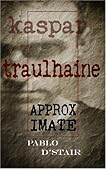
My rating: 4 of 5 stars
Pretty darn good book, overall.
I'll start with what I disliked the book (that being the shorter list):
1. The excessive swearing. Yes, yes, I know the arguments both ways. I've heard one of the authors explain his side of it himself, even. But it's still kind of obnoxious at times.
2. The whole instant-love thing. It just doesn't make a whole lot of sense. Highly enjoyable, and by the end was completely explained, but throughout the early-middle stars were dropping like flies as some nagging impression my parents have left upon me said How irresponsible can these people be?.
Now that that's over with...
Re-iterating: Pretty darn good book. One night, 180-some pages. Fast-paced and wholly enjoyable. Nick and Norah seem to represent the people that pretty much all teenagers, at least in the backs of their minds, want to be. They're not the popular kids--they're the kids who have friends and honestly are happy just like that.
Which, though I'd hate to disagree all of the wonderful, mature adults who have commented on the book, makes it undeniably the opposite of what many people want to say the book is. It isn't a bad influence. The main characters aren't bad people. They don't smoke or drink. And they don't expect everyone to be their friend. It's not like every teenager on the planet is going to have their mind infected with the book and go make out with some random person after reading it.
(For more on this opinion, I must turn yet again to another author, who makes the point about his own book in this YouTube video.)
The musical current throughout the book is fantastic. I love music. I am a music nerd. The amount of music in this book (pretty typical of David Levithan, as I am discovering more and more) makes me happy. If you are a music nerd, it will make you happy too. But, yeah, read the book even if you're not. Because it isn't essential to be a music nerd or to know a lot about New York City to get the book.
Final summary: It's like a trashy novel but for intelligent people, particularly the musical type. Very good novel.






